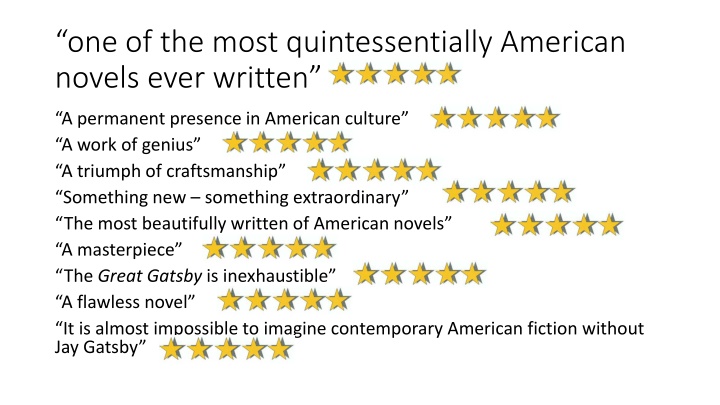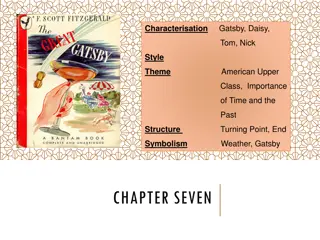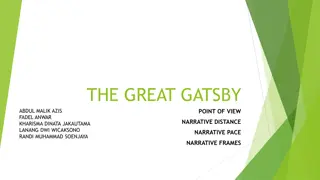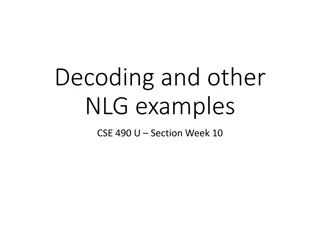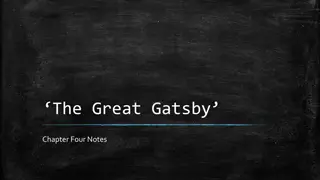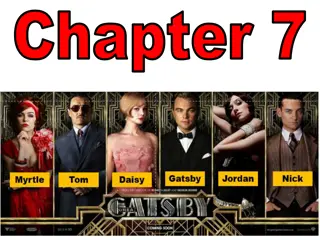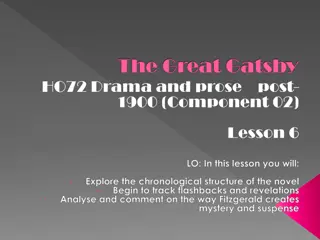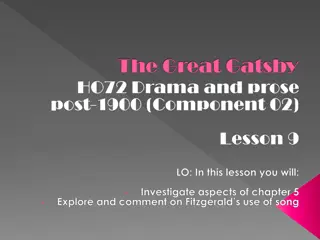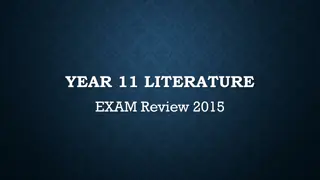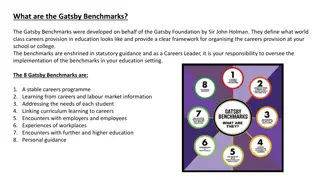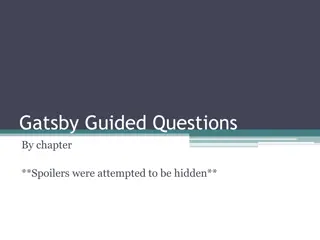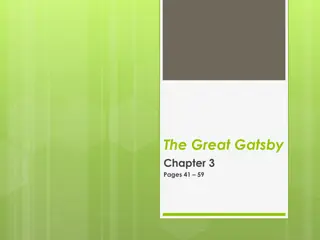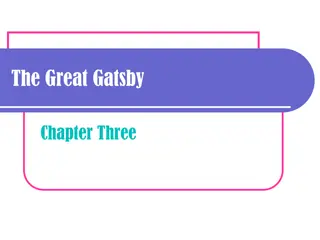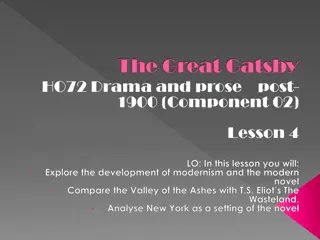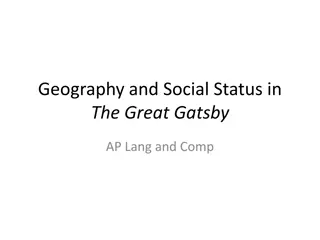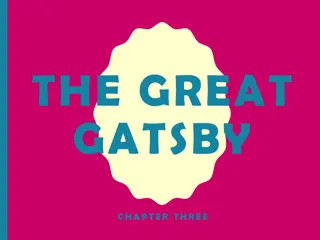Decoding the Narrative Layers in "The Great Gatsby
Exploring the intricacies of storytelling in “The Great Gatsby,” this analysis delves into the essence of story, plot, and narrative. It emphasizes the role of the narrator as a linguistic function and not just a character. The content delves into the saga of events, their narration, and the craft of the author’s choice of storytelling structure. Delve into the essence of storytelling in a quintessentially American novel.
Download Presentation

Please find below an Image/Link to download the presentation.
The content on the website is provided AS IS for your information and personal use only. It may not be sold, licensed, or shared on other websites without obtaining consent from the author.If you encounter any issues during the download, it is possible that the publisher has removed the file from their server.
You are allowed to download the files provided on this website for personal or commercial use, subject to the condition that they are used lawfully. All files are the property of their respective owners.
The content on the website is provided AS IS for your information and personal use only. It may not be sold, licensed, or shared on other websites without obtaining consent from the author.
E N D
Presentation Transcript
one of the most quintessentially American novels ever written A permanent presence in American culture A work of genius A triumph of craftsmanship Something new something extraordinary The most beautifully written of American novels A masterpiece The Great Gatsby is inexhaustible A flawless novel It is almost impossible to imagine contemporary American fiction without Jay Gatsby
The Great Gatsby Introduction to Narrative
The Saga of the Story v Plot v Narrative The Saga of the Story v Plot v Narrative Story: a series of real or fictitious events connected by a certain logic or chronology, and involving certain characters Plot: the narration of this series of events the way in which the events are told The narrative: the method by which the narrator (or narrators) select, organise and present the events, (settings, time, characters, voices, points of view etc) and the author s choice of narrator According to The Glossary of Contemporary Literary Theory (ed. Jeremy Hawthorne, 2000)
Not forgetting the Not forgetting the Narrator: the linguistic function and not a person, which expresses itself in the language that constitutes the text (Mieke Bal, 1985, 119)
In other words: Story: What? Plot: How?
DO WE TRUST HIM DO WE TRUST HIM? No Gatsby turned out all right at the end; it is what preyed on Gatsby, what foul dust floated in the wake of his dreams that temporarily closed out my interest in the abortive sorrows and short-winded elations of men. My family have been prominent, well-to-do people in this Middle Western city for three generations. The Carraways are something of a clan, and we have a tradition that we re descended from the Dukes of Buccleuch, but the actual founder of my line was my grandfather s brother, who came here in fifty-one, sent a substitute to the Civil War, and started the wholesale hardware business that my father carries on to-day . And so with the sunshine and the great bursts of leaves growing on the trees, just as things grow in fast movies, I had that familiar conviction that life was beginning over again with the summer. There was so much to read, for one thing, and so much fine health to be pulled down out of the young breath- giving air. I bought a dozen volumes on banking and credit and investment securities, and they stood on my shelf in red and gold like new money from the mint, promising to unfold the shining secrets that only Midas and Morgan and Maecenas knew. And I had the high intention of reading many other books besides. I was rather literary in college one year I wrote a series of very solemn and obvious editorials for the Yale News. and now I was going to bring back all such things into my life and become again that most limited of all specialists, the well-rounded man. This isn t just an epigram life is much more successfully looked at from a single window, after all. It was a matter of chance that I should have rented a house in one of the strangest communities in North America.
A few fancy (and not so fancy) terms to do A few fancy (and not so fancy) terms to do with narrative : with narrative : First, (second) or third person narrator Ab initio (meaning from the start in Latin): told from the beginning as opposed to in medias res (meaning in the midst of things in Latin) Non linear narrative: a plot that doesn t run chronologically Flashback or analepsis: an interjected scene that takes the narrative back in time from the current point in the narrative. (With internal analepsis refering to an earlier point in the narrative, and external analepsis to a time before the narrative started) Flashforward or prolepsis: reveals events that will occur in the future. In medias res (meaning in the midst of things" in Latin) is the literary and artistic technique of relating a story from the midpoint, rather than the beginning Reliable or unreliable narrator (Do we believe everything the narrator tells us, or suspect that either deceit or obtuseness on his/her part requires us to see more than he or she does?)
